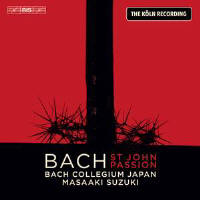Texte paru dans: / Appeared in: |
|
|
Outil de traduction ~ (Très approximatif) |
|
|
Reviewer: Raymond
Tuttle
This release is labeled “The
Köln Recording,” and you well might ask, “Why Köln?” In the spring of 2020,
Bach Collegium Japan was on a European tour, and by the middle of March they
had reached that city. Unless you have been living in an alternate universe
for the past year, you will realize that Bach Collegium Japan’s visit to
Cologne coincided with the rapid shuttering of life as we know it, due to
the COVID-19 pandemic. The performers were told that their remaining
concerts had been canceled. They were, however, presented with an
opportunity to perform the St. John Passion in an audience-less live
streaming concert if they were willing to wait a few days. What to do in the
meantime? Masaaki Suzuki’s wife, an alto in the chorus, suggested that they
should record the work with the performers on hand, and that is how this
recording came about. In other words, this is a studio recording of a major
work that took place after almost no planning whatsoever—a rare if not
unprecedented circumstance. An engineering team and recording equipment were
assembled in a matter of days, and the recording took place in the Kölner
Philharmonie. It was a race against time, as the local Polizei were champing
at the bit to close the Philharmonie down. (Fortunately, one of them was a
music-lover, and an additional hour was granted.)
This, of course, is a
fascinating and touching story. As Suzuki writes, “Looking back, it was all
like a miracle, and even now it seems like a dream. The tension of the whole
experience, combined with the dramatic tension of the St. John Passion, will
stay in our minds forever.”
I wish I could say that the
miraculous and (probably) unprecedented circumstances that gave rise to this
recording are mirrored by a miraculous performance of the music. To be
honest, while this is a good performance of Bach’s score, I do not find it
memorable. Suzuki is correct in referring to the music’s “dramatic tension.”
This is a performance that is more dramatic than devout. That is a valid way
of performing the St. John Passion, and there will be listeners who like it
that way, but I am not among them. For example, in the chorus “Ruht wohl,”
the work’s penultimate section, there is little sense of the tender lullaby
suggested both by the text and by the gentle rocking of Bach’s music. For
me, the contrast between that chorus and the anguished opening chorus,
“Herr, unser Herrscher,” cannot be overemphasized; here, they sound too
similar. This St. John Passion rushes breathlessly from one incident to the
next in Christ’s final day. The arias, which can be pauses for reflection,
and oases of beauty within the ugliness of the crucifixion, hardly seem so
here, and I think that is a loss.
Among the soloists, the
standouts are tenor Zachary Wilder and (male) alto Damien Guillon. I am not
drawn in by James Gilchrist’s Evangelist, perhaps because of the atmosphere
of nervous tension, and that is problematic, given how central his role is.
Both the chorus (about 20 singers, judging from the contemporaneous YouTube
video) and the orchestra (about 23) are polished, of course, and also
involved, but the warmth that I listen for in this music is lacking.
Finally, while the engineering is good, I do not think that it is
consistently up to the label’s high standards. Of course you should not take my word for it. The aforementioned YouTube video, recorded on March 15, 2020, will help you to decide if this recording fills a void in your collection. Note, however, that the soprano in the video (Aki Matsui) is not the same as on these discs (Hana Blažíková). This is not explained. I have been telling my students to take many photographs and to hold on to many memories during this pandemic because their children and grandchildren will want to know what it was like. I think this St. John Passion will fulfill a similar function, and that, when the final trump (pardon my choice of words) is sounded, this recording will be remembered as “the pandemic St. John Passion.” That sounds like a back-handed compliment at best.
| |
|
|
|
|
Cliquez l'un ou l'autre
bouton pour découvrir bien d'autres critiques de CD |
|




